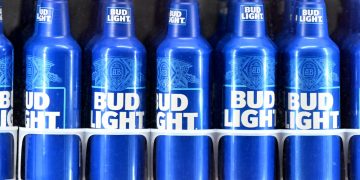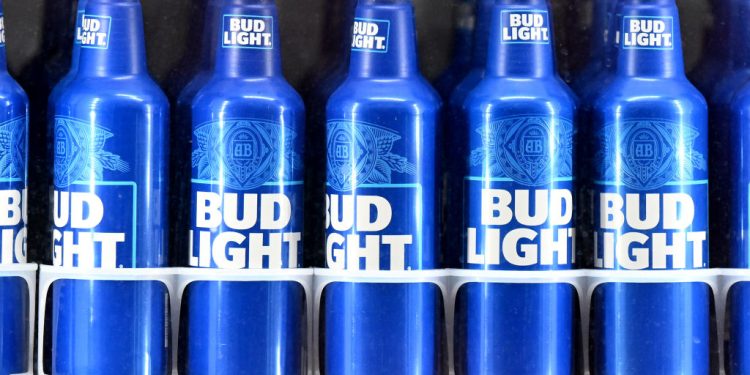After becoming the victims of the most successful conservative boycott in history following their disastrous Dylan Mulvaney sponsorship, Bud Light execs have been using ploy after desperate ploy to regain the brand’s lost dominance.
So far, none of them have produced the results the once ubiquitous beer brand hoped, but that isn’t stopping them from trying again at this year’s Super Bowl.
And according to The Wall Street Journal, they’re planning on spending good money to win back their former customers.
As the Journal reports, Anheuser-Busch is planning to show a series of ads around the Super Bowl, promoting Bud Light first and foremost, but also their light beer, Michelob Ultra, and their original beer, Budweiser.
Anheuser-Busch revealed that, regarding the content of the three ads, they’re running “a minute-long Michelob Ultra commercial featuring soccer legend Lionel Messi, as well as a 30-second Budweiser spot highlighting the work of its wholesalers and featuring its Clydesdale horses.”
According to the Journal, commercial spots for the Super Bowl cost around $7 million per 30 seconds, “but prices can vary based on factors including how many spots companies buy.”
In the words of Kyle Norrington, Anheuser-Busch’s chief commercial officer, “You’re going to see what … our brand lovers expect, which is some really funny advertising.”
Well, humor tends to be pretty subjective, but, as we’ve seen over the past year since the boycott began in March, the brand has been pulling back from former Bud Light marketing chief Alissa Heinerscheid’s efforts to “modernize” the brand.
If you don’t remember, it was Heinerscheid that orchestrated the infamous TikTok video.
In that video, trans TikToker Dylan Mulvaney, dressed like Audrey Hepburn in the 1961 film “Breakfast at Tiffany’s” (because a sophisticated European actress like Hepburn would of course drink cheap American beer), showed off a can they sent him with face on it, celebrating his 365th day of “girlhood.”
[firefly_embed]
[/firefly_embed]
And, aside from distancing themselves from Mulvaney, the unspoken aspect of their new strategy seems to be returning to the “fratty, kind of out-of-touch humor” Heinerscheid decried in a podcast interview that went viral in the wake of the Mulvaney disaster.
Their ads since March have included “beer drinkers burning bare feet on sun-scorched asphalt and falling out of a hammock,” and “fans carrying out idiosyncratic game-day traditions.”
It seems that Anheuser-Busch believes that, if they just return to the marketing strategy they had before Heinerscheid sought to make the brand more politically correct, that’ll collectively erase the memory of Mulvaney’s face on their beer can and their customers will return as if nothing ever happened.
The thing is, Bud Light has been running these same kinds of throwback commercials for almost a year, and it hasn’t worked.
As the Journal reports, the Mulvaney sponsorship cost “Bud Light its title as the top-selling U.S. beer to Modelo Especial,” and they are still floundering.
Also note that Bud Light never actually issued a decent apology or acknowledged the primary reason why sponsoring Mulvaney enraged their fans.
Instead, they’re behaving like an abusive boyfriend who drastically crosses the line, then thinks he can make it better by acting as loving as he did at the beginning of the relationship, without acknowledging or owning up to any wrongdoing.
Honestly, injecting humor back into their advertisements is not going to win their customers back, at least not on its own.
But, like most major corporations, Anheuser-Busch is too afraid to take anything resembling a countercultural stance. So instead, they fence sit, trying to appease both parties without committing to either.
Before the controversy that might have been a smart business decision, but after, it just reeks of cowardice.
The bad news for Bud Light is that, unless they address the controversy directly and actually own up to it, a few funny commercials during the Super Bowl will be, for most people, too little, too late.
This article appeared originally on The Western Journal.

























